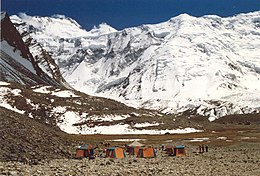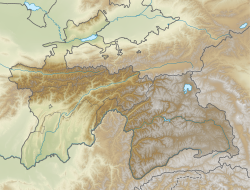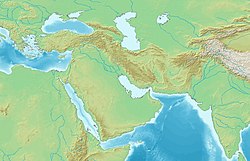Tajik National Park (Tajik: Боғи миллии Тоҷикистон, romanized: Boghi millii Tojikiston; Russian: Таджикский национальный парк, romanized: Tadzhikskiy natsional'nyy park) is a national park and nature reserve in eastern Tajikistan. It was established in 1992 and expanded in 2001 to include parts of the Pamir Mountains. The park covers 26,116.74 square kilometres (10,083.73 sq mi) or a little over 18 percent of Tajikistan's total area.
| UNESCO World Heritage Site | |
|---|---|
 Ismoil Somoni Peak in 1989 | |
| Location | Tajikistan |
| Criteria | Natural: |
| Reference | 1252rev |
| Inscription | 2013 (37th Session) |
| Area | 26,116.74 km2 (10,083.73 sq mi) |
| Coordinates | 38°45′54″N 72°18′19″E / 38.76500°N 72.30528°E |
History
editFrom 1989 to 1992, Anvar J. Buzurukov (as the head of the Protected Areas Department of the Ministry of the Environment) initiated, planned and led (under the international scientific camp "Pamir-90") scientific feasibility studies towards establishing the first national and natural parks in the Tajik Soviet Socialist Republic. An area of 12,000 square kilometres (4,600 sq mi) was designated Tajik National Park by Decision No. 267 of the Tajikistan government on 20 July 1992. A year before the same team established the first nature reserve in Tajikistan, Shirkent Nature Park.
In 2001 the area of Tajik National Park was increased to 26,116.74 square kilometres (10,083.73 sq mi) by the Order of the Government of the Republic of Tajikistan No. 253.
Ecology and wildlife
editThe national park features a mix of steppe, desert, grassland and alpine regions. It has long cold winters and cool summers, with an average annual rainfall of 12.7 cm.[1]
Species known to live in the national park include the brown bear, snow leopard, wolves, markhor, Marco Polo sheep, brown-headed gulls and bar-headed geese.[2]
World Heritage status
editIn 2008, the national park was submitted to UNESCO with a view to becoming a World Heritage Site. In 2013, the park was accepted as World Heritage.[3]
-
The Pamir Mountains
-
Map of eastern Tajikistan and the Pamir Ranges, showing Tajik National Park outlined in green
References
edit- ^ "Pamir". InfoPlease. Retrieved 8 November 2018.
- ^ "Pamir alpine desert and tundra". Terrestrial Ecoregions. World Wildlife Fund.
- ^ (in English) Mount Etna and the Mountains of Pamir inscribed on World Heritage List alongside El Pinacate and Gran Desierto de Altar, whc.unesco.org, 21 June 2013.

